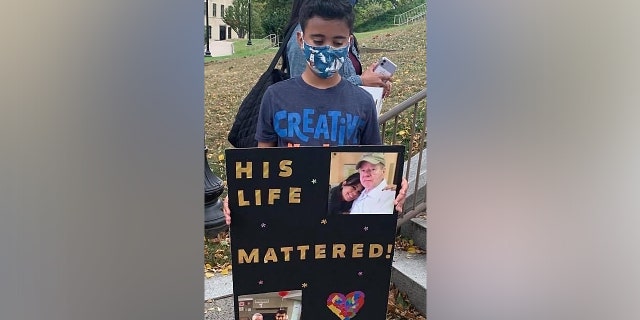The system of adult guardianship is intended to protect vulnerable elders. Instead, it’s lining the pockets of lawyers and guardians.
This story was originally published by Searchlight New Mexico.
 |
| Rio Hamilton chats with his mother at the nursing home where she was placed, against her will. |
LAS CRUCES — Dorris Hamilton, a 91-year-old retired middle-school principal, had started to notice some odd things happening in her life: She had stopped receiving all mail at her home of 50 years right off Las Cruces’ busy Main Street. She was locked out of all four of her bank accounts across town. Then, one morning in late August 2019, someone knocked on her door and presented her with a document issued by a judge, authorizing her “transport” to a nursing home.
In disbelief, Hamilton got into her gold Nissan Altima and drove to the Third Judicial District Court to find the judge who had ordered this.
Sgt. Robert McCord of the Las Cruces Police Department found her in front of Courtroom 1. She had her papers in the pocket of her vest, and wore a black bell-shaped hat adorned with two pins — a silver butterfly and two golden owls.
She was being stripped of her rights, she told McCord.
“I’m a citizen. I pay my bills,” she said on body-camera footage of the encounter.
“Dorris, I do understand what you’re saying,” McCord said. “But I do know that a judge has put these people in charge.”
“Why?” Hamilton replied. “I haven’t talked to the judge. How can anybody be in charge of my business?”
McCord couldn’t muster much to answer that question, and he had orders. He gently loaded her into the passenger seat of his squad car, as she argued her case, and drove her to the hospital. The next day, she was moved to the Village at Northrise, where she’s been ever since.
Hamilton had fallen into a system known as adult guardianship, intended to protect vulnerable elders who are no longer able to make their own decisions. A court-appointed guardian has the power to make those decisions for them. In reality, the system can strip away a person’s entire independence and funnel their savings into the pockets of lawyers and guardians while leaving them vulnerable to abuse.
Removing someone’s autonomy, and giving someone else almost complete power over them, is a messy and dangerous wager.
 |
| Dorris Hamilton's birthday at the Village at Northrise on March 7, 2020, right before covid-19 restrictions stopped them from visiting each other. Photo Courtesy of Rio Hamilton |
Overtaxed and opaque
Guardianship is the most restrictive protection for elders — from themselves, from family members, from friends — and can be necessary or even lifesaving in some cases. Yet previous reporting has documented a pattern of abuse across the country, and problems with guardianship are notoriously difficult to track. Nationally, 1.5 million elders are under guardianship, according to a widely cited report from a Florida court auditor, and the guardians caring for these elders hold $273 billion in assets.
Along with other popular retirement
states, New Mexico has experienced and exposed some of the most
prominent cases of abuse. Employees of two local guardianship firms,
Ayudando Guardians and Desert State Life Management, embezzled a
combined $15 million from their clients, and the CEOs of these companies
were sentenced to prison time.
In 2016, an Albuquerque Journal investigation exposed how an overtaxed and opaque legal system with large numbers of vulnerable elders makes it possible for an unethical guardian to operate with relative impunity.
Pamela Teaster of the Virginia Tech Center for Gerontology is one of the few academics researching guardianship.
“When I started putting newspaper articles together, I began to see these pockets of corruption that pop up across the country,” Teaster said.
In 2018, prompted by the Journal investigation, state lawmakers passed an ambitious slate of reforms to guardianship. These new laws required guardians to be certified and to provide accurate and timely information on care, stopped guardians from limiting family visits, and opened the court hearings to the public.
Those efforts at reform continue. A new bill introduced this week, House Bill 234, would require state oversight to certify and monitor guardians.
But these laws do little to address how and why guardianships begin in the first place.
Guardianship begins in court, an arena that reforms have left virtually untouched. In 2018, the New Mexico state court system rejected recommendations to hire new auditors and other positions to oversee guardianship cases, instead turning to the office of the state auditor for oversight. But the state auditor cannot audit a case unless a district court judge refers it to them. In Hamilton’s case, Chief Judge Manuel Arrieta has not done this.
New Mexico’s courts also rejected a set of model laws focused on shifting guardianship’s legal approach to protecting elders’ rights and minimizing intervention.
One of these laws would have limited the ability of an attorney to argue in the elder’s “best interest,” and instead require attorneys to prioritize the elder’s wishes and previous planning.
A woman of firsts
 |
| Dorris Hamilton at a family reunion in Pine Bluff, Arkansas. Photo Courtesy of Rio Hamilton |
Since the early ’70s, Dorris Hamilton had lived in the same modest ranch home, with a manicured lawn and a grill in the backyard. She moved there after separating from her husband, and in doing so became one of the first Black women in the country to obtain a mortgage. Rio Hamilton remembers people coming from all around New Mexico to congratulate her.
In fact, Dorris Hamilton was a woman of firsts. She was the first Black principal in New Mexico, and the first Black woman to graduate from University of Arkansas' main campus.
For birthdays and holidays, Dorris and Rio Hamilton would drive all the way back to Arkansas, the long ride filled with lectures on geography and the landmarks they passed. “I always thought that Dorris Hamilton was the smartest woman in the world, because she knew everything,” Rio Hamilton said. “And she did.”
He also remembers her as the strictest mom on the block.
After he turned 15, his mother bought him a red MG Midget, a two-seater sports car, and made only one request: no speeding. Within weeks, though, he got a ticket. Two weeks later, he got another. He knew that his mother saw it in the mail, but she didn’t say anything.
Then he walked outside one morning and the car was gone. Thinking it was stolen, he called his mom to tell her what happened. “I sold it,” he remembers her saying, and there was no arguing.
But by the time his mother reached her 80s, Rio Hamilton noticed her meticulousness starting to fray.
The Christmas decorations stopped coming down, and the house began to pile up with old mail and boxes.
Even as her hoarding got worse, she explained it away.
 |
| Rio Hamilton's second-grade school picture. Photo Courtesy of Rio Hamilton |
“To have her explain it to you at that time,” Rio Hamilton said, “it actually kind of made sense.”
Still, she knew she wasn’t as capable as she once was. She decided to give her son power of attorney, allowing him to make some decisions on her behalf. On Saturday, July 20, 2019, they went together to see a lawyer to help draft the document.
That lawyer, CaraLyn Banks, is one of just a few lawyers who practice guardianship law in Las Cruces. She has practiced law for nearly three decades and has no record of disciplinary action with the New Mexico Bar Association.
They didn’t finish the process in that first meeting, but Rio Hamilton remembers that as they left the office, Banks mentioned knowing someone who could help clean out his mother’s house. Banks said she didn’t say anything about Dorris Hamilton’s home, but that she spoke to Rio Hamilton about guardianship for his mother on the phone after the meeting.
Just a few days later, Rio Hamilton was traveling for work when he got a series of emails from Banks.
After the meeting, Banks had filed an emergency petition for Dorris Hamilton’s guardianship, recommending that Advocate Services of Las Cruces become Dorris Hamilton’s guardian as soon as possible. She had filed it in Rio Hamilton’s name: He was listed as the petitioner, and Banks identified herself as the attorney to petitioner and Advocate Services as the recommended guardian.
The petition was approved in four days, without a court hearing. One month later, Dorris Hamilton met McCord in the courthouse and was taken away.

A quick trip to guardianship
Banks’ and Rio Hamilton’s accounts differ as to how that happened: Banks said he was aware that the power of attorney was not sufficient. She said she called him and left a message, although she did not call Dorris Hamilton to inform her. Rio Hamilton said he had no idea about the petition, and still believed that Banks was helping him clean his mother’s home.
What’s clear, though, is that just a few days passed between the Hamiltons’ meeting with Banks and the emergency petition for guardianship.
Given guardianship’s restrictive nature and the difficulty of reversing it, the process is supposed to be deliberate and rare. The petition for guardianship itself even requires the petitioner to affirm that every other option besides guardianship has been explored.
“We have every responsibility as a society to try to help people stay as autonomous as they possibly can,” Teaster, the Virginia Tech professor, said. “And when we have to shave some of that off, in the name of safety, we had better make sure we’re doing it for the right reasons, and only as much as we have to.”
There is no easy way to find out who has a guardian, who that guardian is, or for what reasons. Only elders and their families have access to their guardianship information. When Searchlight New Mexico petitioned for access to the court records of Dorris Hamilton’s case, Banks filed a response opposing the petition. A hearing for Searchlight’s motion was never scheduled.
Still, Searchlight talked to five families in guardianship battles with both Banks and Advocate Services, and analyzed 20 cases involving Banks and Advocate Services, most now accessible because the elder under guardianship has died.
The stories the families shared bear striking similarities to the Hamiltons’ and one previously documented by the Albuquerque Journal: They involve a child or relative who is living out of state, an elder living alone, an emergency petition, and a lengthy series of court hearings where Banks represents the elder against their children or relative, arguing that the elder should remain in the care of Advocate Services.
Advocate Services and Banks both get paid through the elder’s estate. With each hearing comes the possibility of more attorney fees and costs to the elder’s estate and to their family.
Many of the court battles become messy. Advocate Services’ (and Hamilton’s) lead guardian, Sandy Meyer, has filed several restraining orders against families.
In 2019, Meyer accidentally sent an email to Rio Hamilton’s lawyer that was intended for Banks. “Do we have to get a restraining order against this guy,” she wrote. “He reports he comes twice a year and knew the condition of the house etc. what do we have to do to stop him in his tracks?”
After multiple requests for comment, Meyer responded in an email, “Contested guardianships do not make us more money. It can cost us more unpaid-time.” Last week, she filed a request with the court to be allowed to step down as guardian if the judge approves a substitute.
The 2018 reforms prevent guardians from barring families from seeing an elder, including through a restraining order. They also require guardians to be certified, which Advocate Services was not when it was appointed Dorris Hamilton’s guardian in 2019. The agency only became certified in late 2020.
In one case, Banks filed an order to void an adult child’s power of attorney so that Advocate Services could become his parents’ guardian. The son in that case, Jack Alvarez, is a 70-year-old retired military contractor from Hatch, New Mexico, who had helped his parents plan their will. Then Banks filed an emergency petition and Advocate Services became his parents’ guardian.
“My parents are just a case, and that’s more money into their business,” Alvarez said.
Banks contests that she is not separating elders from their relatives, and says she is just protecting them.
Three lawyers who are involved in family law in Las Cruces expressed concern that Banks and Advocate Services may be using unethical but legal methods for obtaining and asserting guardianship. (These attorneys frequently face them in court, and so ask to remain unnamed.)
They described what they saw as “inappropriate,” and “awful.”
A say in the plan
Nearly every morning since August 2019, Dorris Hamilton wakes up in the memory-care unit of the Village at Northrise in Las Cruces. Only 10 minutes across town, Rio Hamilton awakes in his childhood home. He moved back in the fall of 2019 and repaired the house, so that if Advocate Services is ever removed as his mother’s guardian, he’ll be ready to take care of her.
Every second Sunday of the month, he joins a Zoom call of New Mexican families with loved ones in adult-guardianship cases. The consensus in the group is that though laws changed for the better in 2018, bad practices haven’t.
In spite of the trip to the courtroom that ended Dorris Hamilton’s independence, she didn’t get to speak in court for six months.
Guardianship is difficult to contest because an elder often can’t speak for themselves in court, and even if they do, their words don’t carry legal weight. To be put under guardianship, an elder must first be deemed legally incapacitated. And once deemed legally incapacitated, they can’t argue on their own behalf.
This circular logic makes it difficult for elders to argue for their rights to be restored or for changes to their guardianship. Attorneys also say it means Banks doesn’t have to argue for what Dorris Hamilton wants, and can instead argue for what Banks determines is best.
Dorris Hamilton told the judge that she wanted to be a part of the decision-making about the last years of her life.
“I’m perfectly capable of doing this myself along with my son,” she said. As for guardians, she said: “These other people don’t know me, or what I have, or what I’m going to do, or what my plans are, or any of those things for the future. So why should they be stuck in [the plan]?”
“Because the court has plans for you,” Chief Judge Manuel Arrieta responded, and the hearing moved on.
















